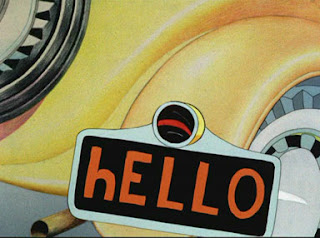- This is the second appearance of Egghead, a character that debuted several months earlier, in "Egghead Rides Again". In this cartoon, he's almost some kind of precursor to Droopy.
- Wolf was voiced by storyman Tedd Pierce.
- Little Red Walking Hood is imitating Katherine Hepburn, both with the voice, and the typical body mannerisms.
Here are the screenshots taken from the new restored print that appeared on Looney Tunes Golden Collection vol.5.



















































































Six years later, Avery will have another take at Red Riding Hood story. Only, this time, things are going to be quite different...
From "Little Red Walking Hood" (1937)
to "Red Hot Riding Hood" (1943) (something new has been added)
Wolf and Grandma also went through the drastic change of their image:

The result: one of the greatest and most legendary short cartoons ever... but that's another story.
"Little Red Walking Hood" (11/6/1937) is Tex Avery's first fairy tale spoof, and it sets the tone and pace for the similar cartoons that Avery will make at WB in the following few years ("Cinderella meets fella", "The Bear's Tale"). What sets this particular cartoon apart from the rest is the fact that nearly all the backgrounds have been drawn with colored pencils. This technique resulted with a very unique storybook look, quite unlike any other Hollywood cartoon of that time. Backgrounds were designed by Johnny Johnsen (sometimes credited as John Didrik Johnsen), Avery's favorite background artist, and his frequent collaborator at WB and MGM studio.
Another particular highlight of this cartoon is the animation by Irv Spence. Many of the other Avery's cartoons from the late 1937-39 period featured an indifferent and not too interesting animation (in comparison to his wonderfully inventive gags and ideas). This cartoon is one of exceptions. Spence is now mostly known as one of the principal animators on Tom & Jerry (he was responsible for some of the funniest and best animation of the famous cat & mouse duo), but the earlier parts of his career were spent at Iwerks, WB (Avery's unit in 1937) and Charles Mintz (Columbia) studios. Spence loved this particular cartoon so much, that he saved all of his original drawings. Because of that, it's easy to identify which scenes were animated by him, and I included the large number of consecutive frames from some of these scenes.
Few curiosities about this cartoon:
Another particular highlight of this cartoon is the animation by Irv Spence. Many of the other Avery's cartoons from the late 1937-39 period featured an indifferent and not too interesting animation (in comparison to his wonderfully inventive gags and ideas). This cartoon is one of exceptions. Spence is now mostly known as one of the principal animators on Tom & Jerry (he was responsible for some of the funniest and best animation of the famous cat & mouse duo), but the earlier parts of his career were spent at Iwerks, WB (Avery's unit in 1937) and Charles Mintz (Columbia) studios. Spence loved this particular cartoon so much, that he saved all of his original drawings. Because of that, it's easy to identify which scenes were animated by him, and I included the large number of consecutive frames from some of these scenes.
Few curiosities about this cartoon:
No comments:
Post a Comment